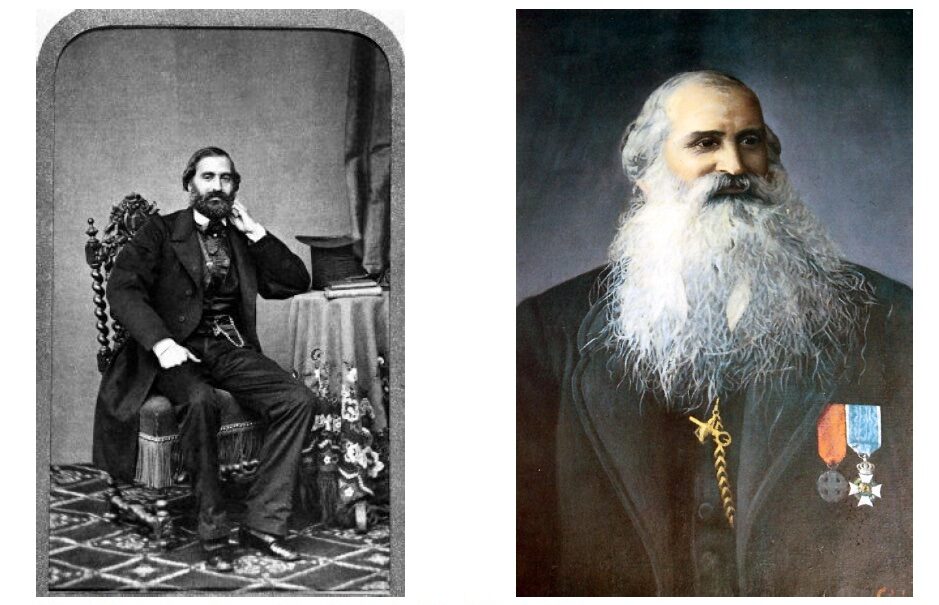Emmanuel Ioannidis (Amorginos) Archive
 Emmanuel Ioannidis was born in Lefkes, Amorgos on May 23, 1823, and died in Hora, Amorgos on March 11, 1906. He was the son of Ioannis M. Zaranis and Kali Sakeliou and was one of the most notable intellectuals of the 19th century in Greece, as well as in communities of the Greek diaspora in Europe, Constantinople and Russia.
Emmanuel Ioannidis was born in Lefkes, Amorgos on May 23, 1823, and died in Hora, Amorgos on March 11, 1906. He was the son of Ioannis M. Zaranis and Kali Sakeliou and was one of the most notable intellectuals of the 19th century in Greece, as well as in communities of the Greek diaspora in Europe, Constantinople and Russia.
He graduated from the Syros high school in 1844 and returned to Amorgos where he worked as a temporary Greek teacher in a school built at the expense of the monastery of Panagia Hozoviotissa. A year later he was appointed as a permanent teacher in the Greek School of Amorgos, which operated under the auspices of the municipality. After three years of service in Amorgos, seeking a degree from a higher education institution, he enrolled in the Faculty of Philosophy at the University of Athens and joined the literary circles of the time, actively participating in the philosophical/political/national developments of those years. Shortly before completing his studies, to better support himself financially, he traveled to Bucharest where he stayed for three years working as a private tutor for prominent families of the Greek diaspora.
In 1856 he returned to Amorgos after twelve years of absence and married his childhood friend Irene N. Vlavianou, with whom they had two children. The first one died shortly after its birth. He remained in Amorgos for five years, working with great zeal as a teacher, hired by the monastery of Panagia Hozoviotissa. However, his low financial earnings lead him once again to leave Amorgos – this time for Constantinople, where he worked as a private tutor.
In September 1860, his wife died of tuberculosis at the age of 36, while their only child was three years old. This, combined with existing professional obligations, drove Emmanuel Ioannidis back to Constantinople where he developed considerable scholarly activity. He founded the “Hellenic Philological Society of Constantinople” in which he served as secretary, librarian, editor of the society’s journal, and curator of its archaeological collections, as well as the “Ecclesiastical Music Society.” He also became an elected member of the Archaeological Society of Rome based on his published studies on archaeological finds in Amorgos. In 1862 he travelled to Taganrog in southern Russia (a port of Rostov in the Sea of Azov) where he worked as a tutor in establishments of wealthy families of the diaspora and was later appointed curator of the Public Greek School of Taganrog.
He stayed in the region for a total of six years, developing significant Greece-related nationalist activity. In 1871 he was appointed director of the Ellinemporiki School of Halki, which developed significantly during his tenure. While in Halki, he created a massive library of more than a thousand volumes which he then transferred to Amorgos. During the next decade he was appointed to various positions in Greek educational institutions (Megalopolis, Thira, Amorgos, Athens), returning permanently to Amorgos in 1882, where he remained until the end of his life. During the last years of his life, he completed the writing of his four-volume work “Amorgika” in which he synthesized his literary, archaeological, and ethnological studies.
It is particularly interesting that part of Emmanuel Ioannidis’ studies consisted of the collection and systematic recording of “customs, traditions, myths, songs and proverbs” from all over Greece. That is, before the establishment of Laography as a science dealing with the manifestations of popular cultures, this eminent Amorgian scholar, living in rather adverse conditions, both personally and on a wider socio-economic level, was able to gather a huge volume of folkloric material which remains relatively unknown, unexplored and unprocessed.
The texts from the manuscript of Emmanuel Ioannidis hosted in the Digital Audiovisual Folk Music Archive of Amorgos and its Islands are of two types: 1) poetic texts which he describes as “songs” and 2) poetic texts in the form of systematically categorized couplets. All of them have been preserved in two manuscript volumes, currently in the possession of the Hellenic Folklore Research Centre of the Academy of Athens, which kindly provided them to our Archive. The texts were transcribed from the manuscript by a scholarly team headed by the paleographer Agamemnon Tselikas and are exhibited in the Archive with the spelling and punctuation of the original.
Samples of the manuscript and its transcription are presented below.

